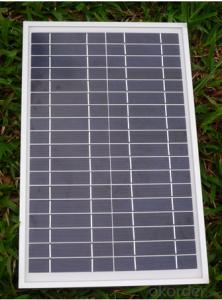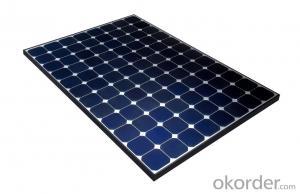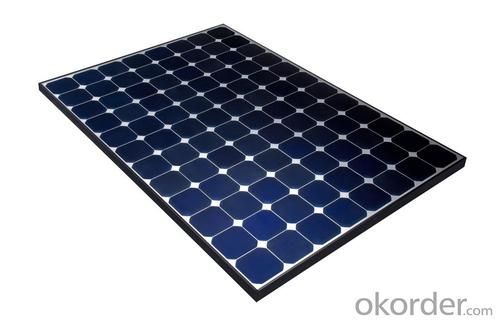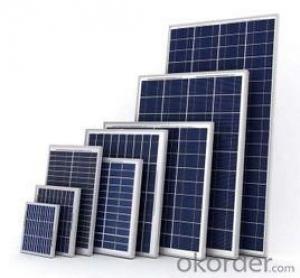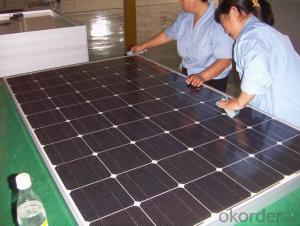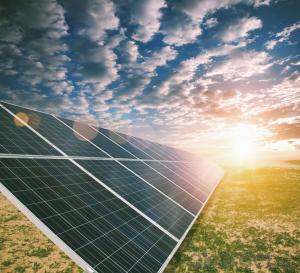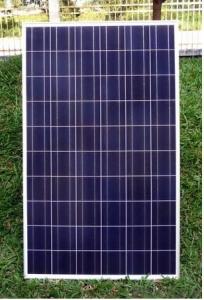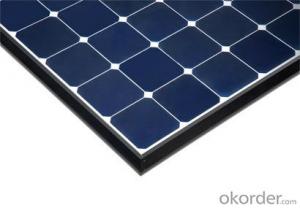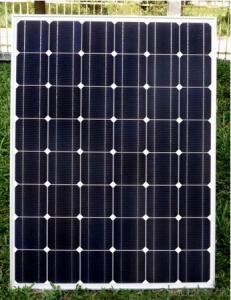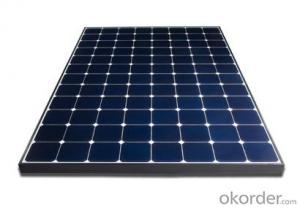Project Solar Panels:Mono Solar Panel 295W A Grade with Cheapest Price
- Loading Port:
- Shanghai
- Payment Terms:
- TT OR LC
- Min Order Qty:
- 50 watt
- Supply Capability:
- 50000 watt/month
OKorder Service Pledge
OKorder Financial Service
You Might Also Like
Specification
Mono Solar Panel 295W A Grade with Cheapest Price
Product description
60 cell multi-crystalline solar module. 40mm natural anodised frame. IP65 rated Jbox, 1m solar cable and a pair of MC4 connectors.TÜV SÜD,SABS ISO 9001:2008 certified.
third generation solar technologies use advanced thin-film cells. They produce a relatively high-efficiency conversion for the low cost compared to other solar technologies. Also, high-cost, high-efficiency, and close-packed rectangular multi-junction (MJ) cells are preferably used in solar panels on spacecraft, as they offer the highest ratio of generated power per kilogram lifted into space. MJ-cells are compound semiconductors and made of gallium arsenide (GaAs) and other semiconductor materials. Another emerging PV technology using MJ-cells is concentrator photovoltaics (CPV)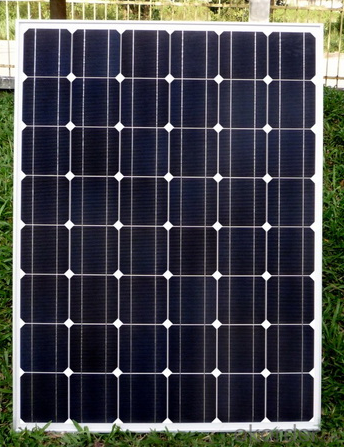
Application
Industrial
Commercial
Residential
Product feather
solar panel refers to a panel designed to absorb the sun's rays as a source of energy for generating electricity or heating.
A photovoltaic (in short PV) module is a packaged, connected assembly of typically 6×10 solar cells. Solar Photovoltaic panels constitute the solar array of a photovoltaic system that generates and supplies solar electricityin commercial and residential applications. Each module is rated by its DC output power under standard test conditions, and typically ranges from 100 to 365 watts. The efficiency of a module determines the area of a module given the same rated output – an 8% efficient 230 watt module will have twice the area of a 16% efficient 230 watt module. There are a few solar panels available that are exceeding 19% efficiency. A single solar module can produce only a limited amount of power; most installations contain multiple modules. A photovoltaic system typically includes a panel or an array of solar modules, a solar inverter, and sometimes a battery and/or solar tracker and interconnection wiring.
Packaging
24-26pcs into carton 312pcs for 20 foot container 712pcs for 40 foot container.
- Q: I have two solar panels that were going to be trashed at work. I want to use them to charge batteries on my RV but i noticed they put out around 20 volts in direct sunlight. So i am wondering: -isn't this way too much voltage for a 2 volt system? -do a need some sort of a regulator connected to keep them from overcharging?
- 20 volts is a common open-circuit voltage for nominal 2v panels. The panels put out about 5v at full load. If the panel puts out little enough that it takes 20 hours or more to put a full charge in the battery you can get by without a charge controller - just keep the cells topped up with distilled water. A charge controller will do a more efficient job, though. The most efficient charge controllers use what's called Maximum Power Point Technology (MPPT) which lets the panels operate at their most efficient point throughout the battery's charging cycle. Available on OKorder. The charge controller should have the same or higher wattage as the panels it controls - if you're not sure of wattage, assume that they are the same as similar area panels you find for sale. Before buying a charge controller, connect the panels through an ammeter to a discharged battery. They may have been trashed because of damage and low output. You need at least an amp for trickle charge, 5 amps for reasonable recharge times.
- Q: What is the average cost of solar panel installation?
- The average cost of solar panel installation varies depending on several factors such as the size of the system, location, and specific requirements. However, as of 2021, the average cost can range from $11,000 to $20,000 for a residential installation. It's important to note that there may be additional costs involved, such as permits, maintenance, and potential upgrades.
- Q: Rated in kilowatts, what is the maximum output of one 8 by 0 solar panel? Assume this solar panel is located at the equator for maximum sunlight.
- The world record efficiency for a solar panel is about 42%. At the equator, you can get up to about 000W m^-2. The efficiency of commercial cells tends to range from 0-20%. They're almost all single junction cells, so will never exceed 3% efficiency. To work out your maximum power output, multiply 000 x efficiency (as a decimal) x area covered. So an 8m x 0m solar panel would be 80 square metres. At 5% efficiency its peak output would be 2000W or 2kW. Total energy output will be different, since it won't be maximum power output all the time. In fact, it will more likely generate something like 20% of its maximum theoretical output, since the Sun won't always be overhead (and sometimes it's night!). The 2kW panel above might have a mean output of 2.4kW, or 57.6kWh/day.
- Q: My family and I are looking into solar panels for our home. But I'm unsure how it would be priced. This month our home used ,623 kwh. The solar panel company said we should expect $6-$9 per watt used. What would that put as at?
- As the day progresses, solar panels start at near 0% efficiency, then to 00% at high noon, then drops off to 0% in the late afternoon. So you have to ask if the ,500 watt system is the peak output capacity or the AVERAGE output where the average would be near 70% or less of the peak over the day. Just do a LOT of research and number crunching. I'm waiting until it is cheap enough to by the whole system. A warranty is no good if the company goes out of business.
- Q: Is it possible for a 2V rated panel to charge a bank of batteries equal to around 36V? I believe that the panels should equal or exceed the voltage of the batteries but, I'm not for certain.
- you'll have to use 3 panels connected in series or use a dc to dc up converter, the former is a better option
- Q: Can solar panels be installed on parking lots?
- Yes, solar panels can be installed on parking lots. In fact, many parking lots around the world are being equipped with solar panels to generate clean and renewable energy. These solar panels are typically installed on canopies or carports above the parking spaces, providing shade for vehicles while harnessing sunlight to produce electricity. This innovative solution helps to reduce carbon emissions and provides a dual benefit of generating power while maximizing the use of available space.
- Q: where can i get some solar panels for a camper trailer
- I think this is what your looking for.. For future reference all I did was type in, Camper Solar Panel in google. If this is what you wanted please select me as the best answer.
- Q: How much energy can a solar panel generate?
- The amount of energy a solar panel can generate depends on various factors such as its size, efficiency, location, and weather conditions. On average, a standard solar panel can generate between 250 to 400 watts of electricity per hour under ideal conditions. However, it's important to note that energy production may vary throughout the day and across different seasons.
- Q: For example, If I were powering my house with solar panels, would it be more efficient or effective, (or I guess would I get more energy) out of a day that measured 90 degrees Fahrenheit as opposed to a day that is 70 degrees Fahrenheit.
- no only the sunlight is used in generating electricity
- Q: I can't figure out how to charge a Ni Cd (BD 8V Firestorm) battery directly with a solar panel so I've come up with an alternative which might or might not work. I thought I would connect an inverter (I found a nice 400W for $30) to my trucks battery and plug the BD Firestorm battery charger into the inverter. Then I was thinking I could use a 5W solar panel to trickle charge the truck battery and keep it connected after the Ni Cd is charged to ensure the truck battery is topped off. The truck would not be running during this process. Will this solution work? Is there a better solution?
- Two of those solar panels connected in series will easily charge a 8V battery. I would not even be concerned about over voltage the solar cells will have plenty of internal resistance.
Send your message to us
Project Solar Panels:Mono Solar Panel 295W A Grade with Cheapest Price
- Loading Port:
- Shanghai
- Payment Terms:
- TT OR LC
- Min Order Qty:
- 50 watt
- Supply Capability:
- 50000 watt/month
OKorder Service Pledge
OKorder Financial Service
Similar products
Hot products
Hot Searches
Related keywords
